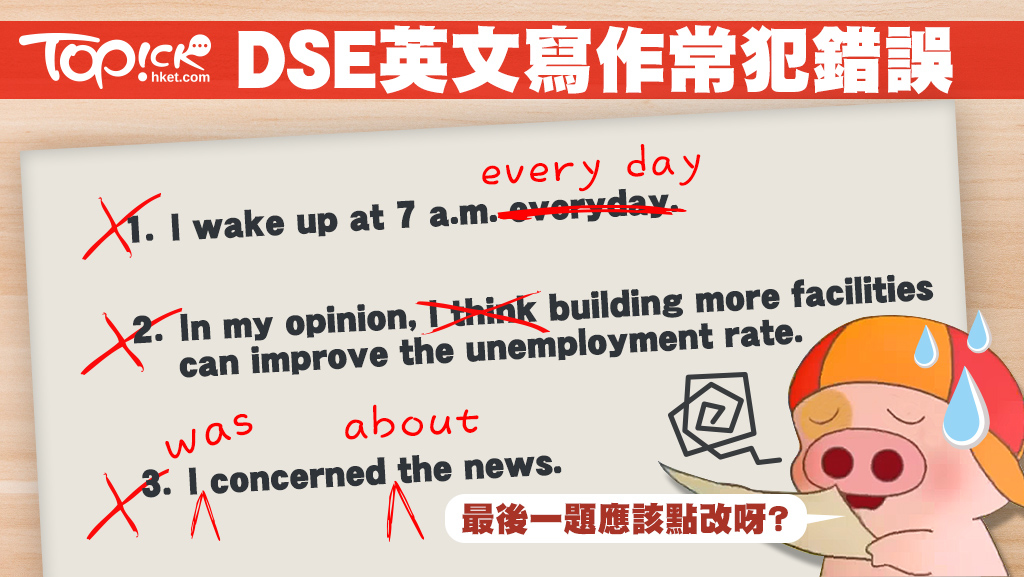DSE英文寫作10大常犯錯誤
發布時間: 2016/04/07 11:14
最後更新: 2020/05/18 13:08

DSE英文周五(8日)開考!不過,英文作文時或許出現不少文法錯誤。想在DSE英文作文卷中突圍,除了講究文章的內容外,文法的準確度是另一致勝關鍵。TOPick請教了現代教育專業英文科導師Tony Chow,為你拆解:
1. 「Everyday」 VS 「Every day」
錯誤示範:
I wake up at 7 a.m. everyday.
「Everyday」 是形容詞(Adjective) ;而「Every day」是副詞(Adverb) 。這句子應選用副詞(Adverb),因為 ‘wake up at 7 a.m.’ 是一個動作。
正確用法1:
I wake up at 7 a.m. every day (adv.)
正確用法2:
This is my everyday (adj.) work.
較簡單的想法是,如果打算用於句首或句尾,大多情況均用副詞(即Every day)。
2. 「Every」 VS 「Each」 後名詞是單數還是眾數?
Tony Chow指出,學生使用「Every」及「Each」 時十分混亂,但其實兩者均指「每一」,所以後面應加單數名詞(singular noun)。
他提議,學生可用這個簡單易記的方法:
聯想「Every day」一字你是不會寫成every days,故「every」後必定加單數名詞。謹記「Children」是「child」的眾數形態,如跟在every或each後應該用child。
正確用法:
Each student hopes to get a good result in the examination tomorrow.
Every student hopes to get a good result in the examination tomorrow.
3. 「Although」和「But」不可以出現在同一句子
錯誤示範:
Although the movie, Ten Years, cost just five hundred thousand Hong Kong dollars to make, but it scooped the Best Movie Award.
中文的說法是「雖然……但是……」,但在英文世界,我們會用一個連接詞連接兩個句子,故在只有兩子句情況下,只需一個連接詞,「Although」和「but」兩者只能活一個,不能同時使用。「Because」及「so」也有同樣情況。
正確用法1:
Although the movie, Ten Years, cost just five hundred thousand Hong Kong dollars to make, it scooped the Best Movie Award.
正確用法2:
The movie, Ten Years, cost just five hundred thousand Hong Kong dollars to make, but it scooped the Best Movie Award.
4. 「In my opinion」及「I think」不可以出現在同一句子
錯誤示範:
In my opinion, I think building more facilities can improve the unemployment rate.
在英文中,「in my opinion」等於「I think」。
正確用法1:
In my opinion, our Government should step up efforts to tackle ageing problems.
正確用法2:
I think our Government should step up efforts to tackle ageing problems.
5. 「Easy」 只能用作形容事件
錯誤示範:
Teenagers are easy to make grammatical mistakes.
easy/ hard / difficult/ convenient等應用作形容事情,不是形容人。
我們可以用It is + adjective + for somebody + to-infinitive的句式:
正確用法1:
It is easy for teenagers to make grammatical mistakes.
或 Subject + find it + adjective + for somebody + to-infinitive的句式:
正確用法2:
Students may find it easy to make grammatical mistakes.
6. 「Lack」 VS 「Lack of」
錯誤示範:
The candidate lacks of honesty.
「lack」並非一定加「of」的。「lack」可以作動詞,值得留意的是,「lack」是Transitive Verb(及物動詞),即必須在後加上名詞而不用加上preposition(介詞)。如果同學在lack當動詞時後面加上「of」便會錯:
正確用法:
The candidate lacks honesty.
如果「lack」是名詞的時候,則需加「of」在後面。
正確用法:
There is a lack of concern.
7. 「Suggest」不能加「to-infinitive」
錯誤示範:
I suggest to go to Disneyland at Christmas.
英文中「suggest」應加上bare-infinitive或gerund在後。
正確用法1:
I suggest going to Disneyland at Christmas.
正確用法2:
I suggest we go to Disneyland at Christmas.
Tony Chow指出,2001年高考proofreading就出現過這個問題,考生未有清楚考慮,便將be改或加should在前。其實上述句式是對的,因為suggest後的that clause是有一隱形的should,即I suggest that students (should) be warned of the danger.
8. 「Mind to do」 = 介意去做?
錯誤示範:
Tony Sir wouldn’t mind to give you some tips on English writing.
「mind」不應用to infinitive或bare infinitive。
正確用法:
Tony Sir wouldn’t mind giving you some tips on English writing.
9. 「concern」 VS 「concerned about」
錯誤示範:
I concerned the news.
同學應留意「concern」並不等如「關注」,而是「使關注」,即跟中文的主被動對調。用於被動時,concerned為過去分詞 (可作形容詞),後可用「about」。
正確用法:
The news concerned me. / I was concerned about the news.
10. 「Used to」 VS 「Be used to」
Used to 後加Bare-infinitive(原型動詞),用於一些以前做,現在不做的事。
正確用法:
I used to watch ATV very often.
我以前很常看亞洲電視(背後意思:但現在不是了。)
但is/am/are used to後加ing (因為這個To為preposition,後加名詞,故動詞要轉為動名詞-ing),解作以前不做,最近開始做,強調現在習慣了。
正確用法:
I am used to not watching ATV.
我現在習慣了不再看亞洲電視了。(背後意思:我以前會看亞洲電視,但現在習慣不會了。)
Tony Chow Facebook
祝各位變身英文達人!













